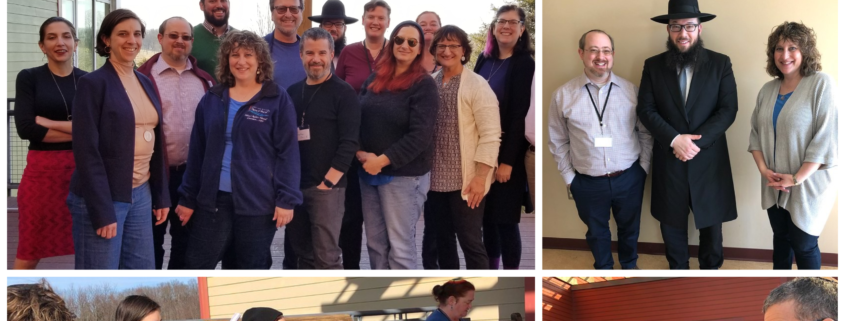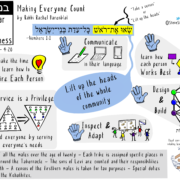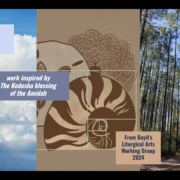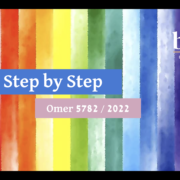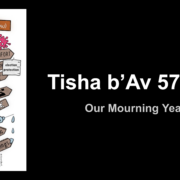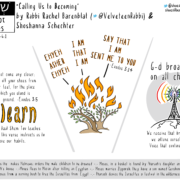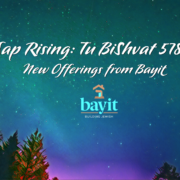Innovating, learning, recharging
Cross-posted from Velveteen Rabbi: reflections on this year’s innovation retreat.
Within moments of arrival we’re talking about how fulfilling it is to learn from each other across the denominations. R’ Evan Krame (The Jewish Studio, Bayit) has designed an icebreaker wherein we withdraw slips of paper from an envelope, each containing a quote, and relate the quotes we’ve drawn to our hopes for our time together. One of the quotes I draw reminds me of the importance of collaboration, and how we can build the Jewish future together better than any of us could build alone.
We study design thinking and innovation with Steve Silbert (Bayit). We talk about the needs we’re trying to meet in the community contexts where we serve (and how do we even know what the needs are?) We talk about buy-in and safety, how to measure whether innovative solutions are working, iterative change (come up with a solution, try it, measure what worked, refine it, try again), rightsizing our questions. We dream follow-up conversations, workshopping ideas, adapting, trying again.
R’ Jeff Fox (Yeshivat Maharat) teaches us mussar (character refinement) and halakha. We learn that our job as human beings is to feel-with others, and to help others carry their burdens. We learn a teaching of R’ Simcha Zissel about tension between imagination (flowing freely) and mind (operating within limits). How does the dialectic between flow and limitation drive innovation? How do we operate from the stance that fundamentally what it means to be a Jew is to ease the suffering of others?
R’ Mike Moskowitz (Bayit, CBST) brings texts about the tension between individual and community. We learn about when it’s okay to delegate someone else to perform a mitzvah, and when we should be wholly present to bring our unique light. We talk about doing mitzvot because we genuinely love the One Who asks us to do so. We leave that session with the framing question “What can I do that no one else can do?” — a way to prioritize our limited time and energy as we try to repair this broken world.
There are so many conversations. We talk about congregational dynamics, about who we serve, about projections and transference, liturgy and melody, best practices in teaching and b-mitzvah education, our work’s challenges and joys. Even aside from the formal learning we’re here to do, the immersion in conversations with wise colleagues is impossibly nourishing. I keep thinking of the Mandelstam quote I drew at the start, about how we can build together what we couldn’t build alone.
We span all the denominations of Judaism, so early on in the retreat we negotiate how to daven together. Davening in a community like this — where we all care about the words, and we’re all dedicating our lives to serving the Holy and serving the community that serves the Holy — is the best medicine there is for my heart. Especially when the davening involves harmony and song, which it always does. There is nothing better, for me. It feeds a part of my soul that is not fed in any other way.
Monday morning we read from Torah. At each aliyah, there is a glorious cacophony of words — some of us using the traditional words, some of us using a more inclusive variation, some of us using the Reconstructing variation; masculine names for God and feminine names for God; all woven into one tapestry of melody and heart. When we sing the words for returning the scroll to the ark, “renew our hearts as of old,” my heart cracks open. It’s ineffable, it’s like water after a long thirst, it’s grace.
The change agency panel features R’ Debbie Bravo (Makom NY), R’ Jeff, and R’ Mike. R’ Mike talks about trans inclusivity in Orthodoxy and about answering people instead of questions. R’ Jeff talks about ordaining women in Orthodoxy, change agency and design thinking, and navigating opposition. R’ Debbie talks about values, community, and how to walk our talk on welcoming. We talk about the loneliness of being a change agent, and about where we find practical and spiritual support.
Shoshanna Schechter (Charles E. Smith) teaches about understanding Gen Z (b. 1997-2012) before we teach them, about navigating Jewish learning and screen time, about kids’ resistance to prayer across all the denominations and how we work with that. We talk about how increasing anxiety among teens impacts our b-mitzvah teaching, and how we teach Jewish values (especially to kids who may be allergic to that term.) That leads us into a conversation about innovation in b-mitzvah prep.
We spend some time sandboxing #MenschUp values education for b-mitzvah learning. We use design thinking and its built-in iterative processes to begin brainstorming how we might co-create learning tools that would help kids meet some of the challenges they face today. What can we do with the “periodic table” of Jewish character traits to teach kids of all gender expressions? What would it look like to build tools for this work in a consciously trans-denominational way?
Over the course of the gathering we experience deep text study and davening and singing. We experience innovation learning, text learning, best-practices learning. We partake in late-night game play and laughter. We grapple with how to innovate wisely and well, and how to meet real needs in the real world. After two days together I’m leaving with a re-filled rabbinic tool box — and maybe even more importantly, a re-filled sense of connection to this calling, and gratitude for the opportunity to serve.
Shared with deep gratitude to this year’s innovation retreat planning team, on which I served alongside R’ Debbie Bravo, R’ Jonathan Freirich, R’ Evan Krame, R’ David Markus, and R’ Alana Suskin. Related: last year’s innovation retreat report.

By Rabbi Rachel Barenblat.

